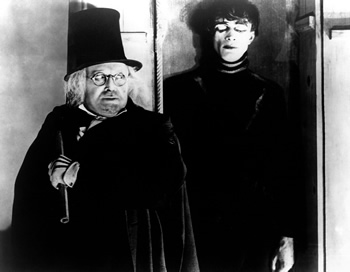The Cabinet of Doctor Caligari
 Released 1920
Released 1920
Directed by Robert Wiene
Writers; Hans Janowitz and Carl Mayer
See the entire film on YouTube by following this link:
https://youtu.be/IP0KB2XC29o
Staring:
Werner Krauss (Caligari) (1884-1959), was a member of Max Reinhardt's company. He was a theatrical actor in the early years of the 20th century. By 1916, he had begun appearing in films, usually playing sinister characters. His theatrical career continued however, and he played in Germany, London, and New York. He was considered among the leading actors of his era. He was also an absolute, unapologetic anti-Semite and an important supporter of the Nazis. After the Nazi takeover, he was appointed to various government positions and personally given the title of cultural ambassador of Germany by Hitler and Goebbels. He increasingly specialized in antisemitic portrayals of Jewish characters, most notoriously in the 1940 film Jud Suss (Suss the Jew). Seen by at last 20 million people, it's considered to be one of the worst pieces of antisemitic propaganda of all time. And, it was no coincidence. In 1941 Krauss played the Jewish character Shylock in Shakespeare's The Merchant of Venice. In an interview he boasted that "his Shylock would be so repulsive 'that no one in the world will ever again accept a slice of bread from a Jew." After the war, Krauss was banned from performing until 1950 and even after that, his appearances were sometimes met with protest. However, he also received several awards including the High Decoration of the Republic of Austria in 1955, so there's that.
Conrad Veidt (Cesare) (1893-1943) became one of the greatest (and best paid stars) of German cinema. He played a wide variety of roles but was particularly known for his portrayal of horror characters. Veidt was a early and strong opponent of the Nazi regime and ultimately donated much of his personal fortune to help the British war effort. He was not Jewish, but his (newly married third) wife, the actress Ilona Praeger, was. Early after the Nazi takeover, he declared himself to be Jewish to show solidarity with the German Jewish community. The declaration made him unemployable in Germany, and he left for Britain where he spent most of the 1930s. There, he had leading roles in numerous films and particularly played parts in anti-Nazi films. In 1940, he left Britain for Hollywood (he had done an earlier stint in Hollywood in the 1920s). He hoped to make films in America that would persuade Americans to join the war against Nazism (Remember that although World War II started in 1939, the US did not join until December 11, 1941, after Germany had declared war on us.). He frequently played Nazi spies in these movies. However, he's almost certainly best remembered for his role as the sinister Major Heinrich Strasser in Casablanca (1942). Many, many actors have copied Veidt's portrayal of Strasser who has thus become one archtype of the Nazi officer. It's a wonderful irony that the man most responsible for creating this character was deeply devoted to fighting fascism. He was only 50 when he died of a massive heart attack. But he had appeared in over 100 films. BTW, he was also an early feminist.
Here's Veidt as Strasser, along with Humphrey Bogart and Claude Rins from Casablanca.
Other fates:
Friedrich Feher (Francis) (1889-1950) was another member of Reinhardt's ensemble. He became a director and then founded his own production company. He fled when Nazis came to power, ultimately coming to the US in 1937.
Lil Dagover (Jane Olsen) (1887-1980) was one of the most popular actors in German film in the 1920s and 1930s. After the Nazi takeover, she continued her career but appeared only in apolitical musicals and comedies. Nonetheless, she was one of Hitler's favorite stars and was sometimes one of his dinner guests. She recieved a War Merits Cross from the Nazi government. Her career continued after the war and she appeared in both movies and TV. Her final role was in Tales from the Vienna Woods when she ws 91.
Hans Heinrich von Twardowski (Alan) (1898-1958) fled Germany in 1933, came to US and frequently played Nazis in US movies.
Rudolf Lettinger (Dr. Olsen) remained in Germany but did not work after 1931 (he was 67 when the Nazis came to power).
The Writers:
Hans Janowitz (1890 - 1954) and Carl Mayer (1894-1944). Janowitz wrote film scripts in the late teens and early 20s as well as satirical songs and ballads for the cabarets, but by the mid 20s he had left the film industry and was running his father's salad oil business. He fled to the US in 1939 and managed a perfume business. Mayer also continued in the movies, working on several films with F. W. Murnau (the director of Nosferatu and several other pioneering films). He fled to London in 1933 and worked as an advisor to the British film industry but was not particularly successful.
The Frame:
One of the most controversial aspects of the film is its story within a story format. This was allegedly devised by Fritz Lang who was originally supposed to direct this picture. The format is arguably one of the aspects of the film that made it successful, however Janowitz hated it. He wrote:
[Wiene changed] our script on a very important point: at the end of the film our symbolic story was to be explained as being a tale told by a mentally deranged person, thus dishonoring our drama - the tragedy of a man gone mad by the misuse of his mental powers - into a cliche, in which every incident was to be explained in a cheap manner, in which the symbolism was to be lost...our Dr. Caligari, the great authority, was mad, mad with the lust to kill, mad with the lust to force his brutal instincts on innocent subjects!"
However, note that Janowitz said all this in an unpublished manuscript after he immigrated to the US, after the Nazi rise to power and long after the film. Janowitz' point was that now, with the frame, we're supposed to realize that Caligari is benign and Francis simply insane. So, the whole thing is just a tale by a madman. But, is that in fact the case? At the end of the film do we trust Caligari and think that Francis is simply mad? Or does is Caligari positioned as part of an even greater plot to dominate and control people? Of course, I think the second. But draw your own conclusions! One thing is clear: the use of the frame greatly increases the complexity and ambiguity of the movie.

Notes on the analysis of Caligari
Next: Charlie Chaplin